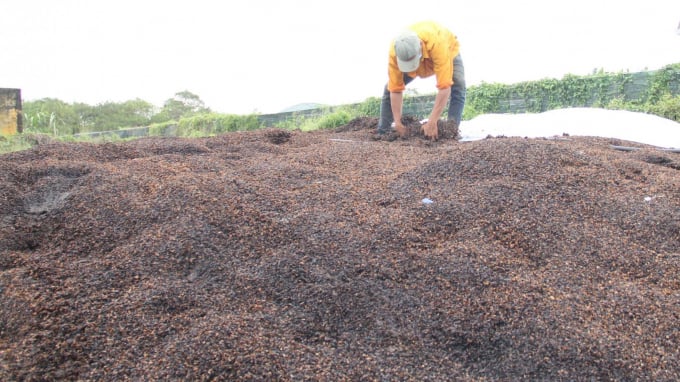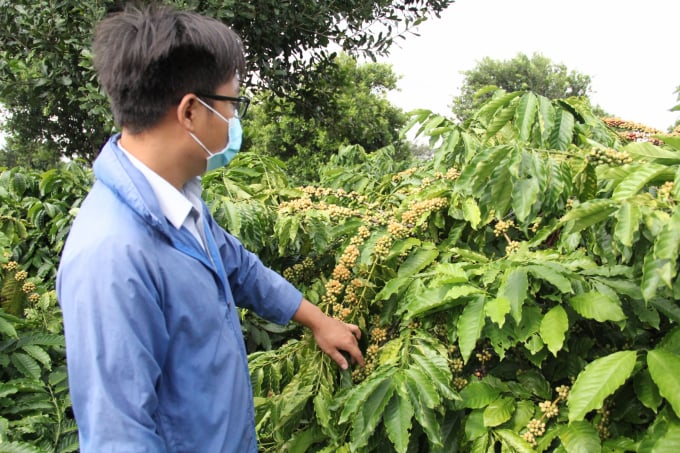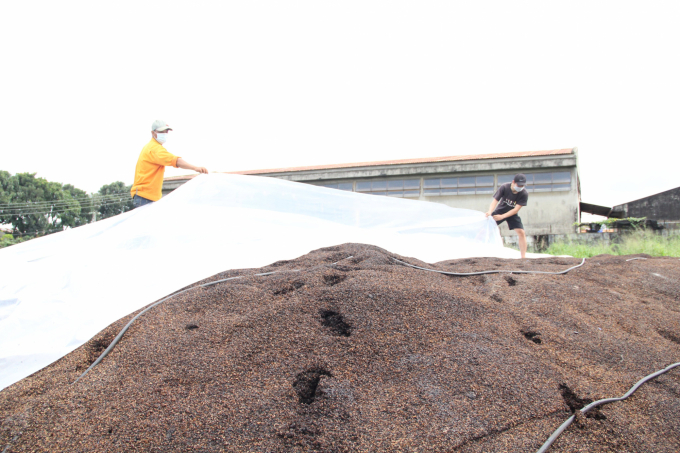May 22, 2025 | 07:50 GMT +7
May 22, 2025 | 07:50 GMT +7
Hotline: 0913.378.918
May 22, 2025 | 07:50 GMT +7
Hotline: 0913.378.918
Mr. Nguyen Van Be, director of MTV Ca Phe 704 in Dak Ha (Kon Tum), stated that for a long time, coffee producers in the province have composted coffee skin into organic fertilizer for trees.
After harvesting, the coffee is dried, processed, and separated into beans and shells. After about 4-5 days of milling, the coffee shells are blended with starch, or buffalo and cow manure in a tank and softly watered to produce moisture before being composted.

Almost the entire coffee shells are used by the Central Highlands locals to make organic fertilizer. Photo: M.P.
After many months of composting, coffee shells are removed and combined with one bag of Trichoderma (3-4kg) in a 5: 1 ratio. The combination is then littered till it changes into organic fertilizer. The organic fertilizer created from coffee shells is released during the wet season and applied to the coffee trees. Reduced fertilizer costs are one of the benefits of organic fertilizer manufacturing.
Currently, Ca Phe 704 has contracted 500ha of coffee trees to farmers in Dak Ha district. After each harvest season, the corporation appoints a service group to mill the coffee and perform basic processing, and the coffee shells are resold to farmers at an affordable price that covers the cost of energy and the amortization of the milling equipment. The enterprise produces around 15 tons of coffee per hectare.

Thanks to the application of organic fertilizers made from coffee shells, coffee grows sustainably with high yields. Photo: D.T.
"Organic fertilizer use in coffee cultivation is still modest, accounting for less than 2% of the total area; only households with the financial capacity may purchase cow manure to fertilize coffee."
At the moment, cow manure costs up to VND 800,000 per ton, a significant economic burden for coffee producers in light of the present price instability. For a long period of time, businesses and coffee farms in Kon Tum have produced organic fertilizer from coffee shells, and the positive results have convinced farmers to follow suit, Mr. Nguyen Van Be said.
"Organic fertilizing using coffee shells has been shown to improve pepper and coffee plant growth and production. Organic fertilizers assist not only the plant but also the soil since they enhance mineral salts and trace elements and help loosen the soil, all of which contribute to soil improvement. The Central Highlands have an abundance of coffee shells, which, when properly used to create organic fertilizers, may help farmers save money and help stabilize the ecosystem.
Director of Cong Bang Ea Tu Agricultural Service Cooperative, Mr. Tran Dinh Trong (Buon Ma Thuot City, Dak Lak).
Coffee shells are used to provide fuel for coffee drying.
Not only are coffee shells composted as organic fertilizer, but growers are also using them as fuel to dry coffee, like the residents of Buon Ho town (Dak Lak) are doing.
"At the moment, Buon Ho Coffee Company owns 600ha of coffee with an average yield of 11 tons per ha; during this year's harvest, the company's employees are expected to harvest 6,600 tons of coffee; after processing for kernels, approximately 1,200 tons of coffee shells remain, the majority of which are used as fuel for drying coffee.
Mr. Le Ngoc Le, Director of Buon Ho Coffee Company revealed that the previous harvest's coffee shells are utilized as fuel to dry the following batch of coffee, hence minimizing the high cost of purchasing firewood and coal.

Every year, the Central Highlands has millions of tons of coffee shell by-products that are composted as organic fertilizers. Photo: M.P.
Previously, Phuoc An Coffee Joint Stock Company (Dak Lak) processed coffee skin into microbial fertilizers. However, owing to excessive restrictions regarding the manufacturing process and certification of microbial fertilizers, Phuoc An Coffee Joint Stock Company ceased processing coffee shells. Since then, agricultural households themselves have composted coffee shells to create organic fertilizer for their coffee plantations or converted them into fuel to dry coffee.
According to Mr. Truong Minh Tuan, Deputy General Director of Phuoc An Coffee Joint Stock Company, this unit now manages 400 hectares of coffee in Krong Pak and 380 hectares in Krong Buk district (Dak Lak), producing an estimated 8,000 tons of fresh coffee.
"During the harvest season, employees harvest themselves, farmers compost coffee shells to create organic fertilizer to re-fertilize the coffee plant, and some are used as fuel in coffee drying ovens," Mr. Tuan stated.
Mr. Phan Trong Ky, director of Chu Kpo Agricultural Service Cooperative (Dak Lak), stated that the unit has around 230ha of coffee, which results in a considerable amount of shells following harvesting. Mr. Ky reports that in recent years, cooperative members have composted coffee hulls with manure and microbes to make organic fertilizer.
"Creating organic fertilizer enables cooperative members to save more than two-thirds of the money they spend on agricultural fertilizer." Fertilizing coffee fields with organic fertilizer generated from coffee pods also improves the soil's fertility and porosity, consequently increasing coffee yield," Mr. Ky said.
Mr. Le Van Thanh, Director of the Dak Lak Crops Production and Plant Protection Sub-Department, stated: "At the moment, Dak Lak province has 208,000 hectares of coffee, produces over 500,000 tons of green coffee annually, and over 456,000 tons of coffee shell by-products." Due to its easy-to-manufacture qualities, farmers in the province have employed the whole coffee husk to generate organic fertilizer, with just a few being used as fuel for coffee drying.
To maximize the efficiency of composted coffee pod manure, individuals should combine it with lime powder and, in particular, probiotics. The fact that farmers use composted coffee husks to generate manure has a number of advantages: it does not contaminate the environment, it aids agricultural goods in ensuring food safety and cleanliness, and it decreases the need of inorganic fertilizers, lowering investment costs and assisting in soil loosening."
Translated by Linh Linh
![Reducing emissions from rice fields: [2] Farmers’ commitment to the soil](https://t.ex-cdn.com/nongnghiepmoitruong.vn/608w/files/news/2025/05/05/dsc08881jpg-nongnghiep-140632.jpg)
(VAN) Clean rice cultivation model in Thuong Tan commune, Bac Tan Uyen district, is assisting local residents in achieving sustainable agriculture by substantially reducing costs, increasing productivity, and protecting the environment.

(VAN) At the conference to disseminate Resolution No. 68, AgriS introduced its digital agricultural ecosystem and reaffirmed its commitment to accompanying the Government in promoting private sector development and sustainable agriculture.

(VAN) 'Blue Ocean - Blue Foods' initiative is designed to restore marine ecosystems and establish sustainable livelihoods for local communities by cultivating a minimum of 1,000 hectares of cottonii seaweed in the first three years.
/2025/05/21/4642-3-112707_603.jpg)
(VAN) The V-SCOPE project has made direct contributions to three out of six pillars of the Comprehensive Strategic Partnership between Vietnam and Australia.

(VAN) Facing the threat of rabies spreading to the community, Gia Lai province urgently carries out measures to vaccinate dogs and cats on a large scale.

(VAN) Disease-free livestock farming not only protects livestock herds but also stabilizes production and livelihoods for many farmers in Tuyen Quang.

(VAN) Japan's grant aid project contributes to capacity building, promoting organic agricultural production, and fostering sustainable community development in Dong Thap province.